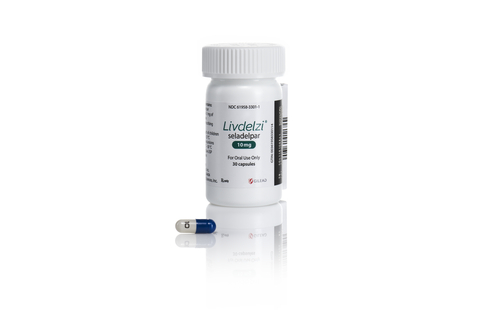Gilead’s Livdelzi (Seladelpar) Granted Accelerated Approval for Primary Biliary Cholangitis by U.S. FDA
– First and Only Treatment to Demonstrate Statistically Significant Reductions Across Key Biomarkers, ALP Normalization and Pruritus Versus Placebo –
– Livdelzi Expands Gilead’s Long-Standing Commitment to People Living with Liver Disease –

Livdelzi (Photo: Business Wire)
The accelerated approval was based primarily on data from the pivotal placebo-controlled Phase 3 RESPONSE study. In the study,
The FDA approved Livdelzi under accelerated approval based on a reduction of ALP. Improvement in survival or prevention of liver decompensation events have not been demonstrated. Continued approval of Livdelzi for the approved indication may be contingent on verification and description of clinical benefit in confirmatory trial(s).
“More people are being diagnosed with PBC, impacting people of varied ages, gender, race and ethnicity. Those living with PBC share common symptoms, including incessant itching or skin-crawling sensations, as well as debilitating fatigue that is made worse by the itching at night,” said Carol Roberts, President, The PBCers Organization. “The availability of a new treatment option that can help reduce this intense itching while also improving biomarkers of active liver disease is a milestone for our community.”
PBC is a rare, chronic, autoimmune disease of the bile ducts that affects approximately 130,000 Americans, primarily women, and can cause liver damage and possible liver failure if untreated. The disease currently has no cure.
Livdelzi, an oral, peroxisome proliferator activated receptor (PPAR) delta agonist, or delpar, is positioned to challenge the current PBC standard of care, which falls short for many people who experience inadequate response to treatment, putting them at risk for continued liver damage. Livdelzi has demonstrated a sustained efficacy and safety profile across its robust development program to date, including a capacity to normalize ALP levels for some of the people studied with PBC. Given ALP levels are recognized as an important surrogate marker of disease progression in PBC, providers are shifting to view ALP normalization as a treatment goal.
“People living with PBC have been waiting for treatment advancements for many years. Today’s approval of Livdelzi, with its distinct profile, provides them with an important new option,” said Daniel O’Day, Chairman and Chief Executive Officer, Gilead Sciences. “We look forward to leveraging Gilead’s long-standing expertise in liver disease to bring this promising new treatment to all those who could benefit.”
The RESPONSE study, in addition to other studies including the long-term open-label ASSURE study and prior earlier phase studies, together represent the experience with Livdelzi in more than 500 participants with PBC. Ongoing studies include the confirmatory Phase 3 AFFIRM study, a randomized, placebo-controlled confirmatory study designed to evaluate the effect of Livdelzi on clinical outcomes in people with compensated cirrhosis due to PBC.
In the RESPONSE study, Livdelzi, given alone or in combination with UDCA as an oral, once-daily medicine, reduced key biomarkers of PBC disease and helped reduce pruritus (chronic itch), which is a common symptom that can significantly impair quality of life in people with PBC. Livdelzi is the only medicine to demonstrate statistically significant and durable improvements in both pruritus and markers of cholestasis related to the risk of disease progression in a Phase 3 trial. The primary endpoint of the study was a composite biochemical response at month 12, where biochemical response was defined as achieving ALP less than 1.67-times upper limit of normal (ULN), an ALP decrease of greater than or equal to
Commitment to Advocacy, Access and Global Reach
The Gilead Support Path® Program offers information and resources to help patients who are prescribed Livdelzi understand coverage and financial options.
Following the acquisition of CymaBay, Gilead will continue to provide funding to PBC patient organizations.
Livdelzi received FDA Breakthrough Therapy Designation, as well as Orphan Drug Designation for the treatment of people living with PBC.
Seladelpar has also been accepted for review by the
Please see below for
About Livdelzi
Livdelzi (seladelpar) is an oral PPAR-delta agonist, or delpar, for the treatment of primary biliary cholangitis (PBC). PPAR-delta has been shown to regulate critical metabolic and liver disease pathways. Preclinical and clinical data support its ability to regulate genes involved in bile acid synthesis, inflammation, lipid metabolism and transport and fibrosis.
Livdelzi has potential to help meet the current unmet need of people living with PBC, as the first and only treatment that achieved statistically significant reduction across biochemical response, alkaline phosphatase (ALP) normalization, and pruritus versus placebo. Pruritus is a common symptom that can significantly impair quality of life in people with PBC.
As part of the FDA accelerated approval, Gilead has committed to a confirmatory long-term outcomes study called AFFIRM, which has already been initiated in people with compensated cirrhosis. Continued approval may be contingent upon verification of clinical benefit in confirmatory trial(s).
Livdelzi is indicated for the treatment of primary biliary cholangitis (PBC) in combination with ursodeoxycholic acid (UDCA) in adults who have an inadequate response to UDCA, or as monotherapy in patients unable to tolerate UDCA.
This indication is approved under accelerated approval based on a reduction of ALP. Improvement in survival or prevention of liver decompensation events have not been demonstrated. Continued approval for this indication may be contingent upon verification and description of clinical benefit in confirmatory trial(s).
Limitations of Use:
Use of Livdelzi is not recommended in patients who have or develop decompensated cirrhosis (e.g., ascites, variceal bleeding, hepatic encephalopathy).
Warnings and Precautions
-
Fractures: Fractures occurred in
4% of LIVDELZI-treated patients compared to no placebo-treated patients. Consider the risk of fracture in the care of patients treated with LIVDELZI and monitor bone health according to current standards of care. - Liver Test Abnormalities: LIVDELZI has been associated with dose-related increases in serum transaminase (AST and ALT) levels > 3 x ULN in patients receiving 50 mg and 200 mg once daily (5x and 20x higher than the recommended dosage of 10 mg once daily). Perform baseline clinical and laboratory testing when starting LIVDELZI and monitor thereafter according to routine patient management. Interrupt treatment if the liver tests (ALT, AST, total bilirubin, and/or ALP) worsen, or if the patient develops signs and symptoms of clinical hepatitis (eg, jaundice, right upper quadrant pain, eosinophilia). Consider permanent discontinuation if liver tests worsen after restarting LIVDELZI.
- Biliary Obstruction: Avoid use of LIVDELZI in patients with complete biliary obstruction. If biliary obstruction is suspected, interrupt LIVDELZI and treat as clinically indicated.
Adverse Reactions
-
The most common adverse reactions (≥
5% ) with LIVDELZI were headache (8% ), abdominal pain (7% ), nausea (6% ), abdominal distension (6% ), and dizziness (5% ).
Drug Interactions
- OAT3 Inhibitors and Strong CYP2C9 Inhibitors: Avoid coadministration with LIVDELZI due to increased LIVDELZI exposure.
- Rifampin: Monitor biochemical response (e.g., ALP and bilirubin) when patients initiate rifampin during LIVDELZI treatment. Coadministration may result in delayed or suboptimal biochemical response of LIVDELZI.
- Dual Moderate CYP2C9 and Moderate-to-Strong CYP3A4 Inhibitors and BCRP Inhibitors (eg, cyclosporine): Monitor closely for adverse effects. Concomitant administration with LIVDELZI may increase LIVDELZI exposure.
- CYP2C9 Poor Metabolizers Using Moderate-to-Strong CYP3A4 Inhibitors: Monitor more frequently for adverse reactions as concomitant use of a moderate-to-strong CYP3A4 inhibitor in patients who are CYP2C9 poor metabolizers may increase LIVDELZI exposure and risk of LIVDELZI adverse reactions.
- Bile Acid Sequestrants: Administer LIVDELZI at least 4 hours before or 4 hours after taking a bile acid sequestrant, or at as great an interval as possible.
Pregnancy and Lactation
- Pregnancy: There are insufficient data from human pregnancies exposed to LIVDELZI to allow an assessment of a drug-associated risk of major birth defects, miscarriage, or other adverse maternal or fetal outcomes. Report pregnancies to Gilead Sciences, Inc., at 1-800-445-3235.
- Lactation: There are no data on the presence of LIVDELZI in human milk, the effects on the breastfed infant, or the effects on milk production. The developmental and health benefits of breastfeeding should be considered along with the mother's clinical need for LIVDELZI and any potential adverse effects on the breastfed infant from LIVDELZI.
About PBC
PBC is a rare, chronic inflammatory liver disease primarily affecting women (1 in 1,000 women over the age of 40 or about 130,000 total people in the
About Gilead Sciences in Liver Disease
For decades, Gilead has pioneered the way forward to improve the lives of people living with liver disease around the world. We have helped to transform hepatitis C from a chronic condition into one that can be cured for millions of people. For people living with hepatitis B or D, our focus on advancing our medicines drives hope that today’s research will turn into tomorrow’s cures. Beyond viral hepatitis, we’re working to deliver advanced treatments for people living with PBC. But our commitment doesn’t stop there. Through our ground-breaking science and collaborative partnerships, we strive to create healthier futures for everyone living with liver disease. We are committed to a future without liver disease.
About Gilead Sciences
Gilead Sciences, Inc. is a biopharmaceutical company that has pursued and achieved breakthroughs in medicine for more than three decades, with the goal of creating a healthier world for all people. The company is committed to advancing innovative medicines to prevent and treat life-threatening diseases, including HIV, viral hepatitis, COVID-19, cancer and inflammation. Gilead operates in more than 35 countries worldwide, with headquarters in
Forward-Looking Statements
This press release includes forward-looking statements within the meaning of the Private Securities Litigation Reform Act of 1995 that are subject to risks, uncertainties and other factors, including Gilead’s ability to initiate, progress or complete clinical trials within currently anticipated timelines or at all, and the possibility of unfavorable results from ongoing or additional clinical trials, including those involving Livdelzi (seladelpar) (such as the RESPONSE, ENHANCE, ASSURE and any confirmatory studies); uncertainties relating to regulatory applications and related filing and approval timelines, including MHRA and EMA reviews of seladelpar for the treatment of PBC; the risk that any regulatory approvals, if granted, may be subject to significant limitations on use or subject to withdrawal or other adverse actions by the applicable regulatory authority; the risk that physicians may not see the benefits of prescribing Livdelzi for treatment of PBC; and any assumptions underlying any of the foregoing. These and other risks, uncertainties and factors are described in detail in Gilead’s Quarterly Report on Form 10-Q for the quarter ended June 30, 2024, as filed with the
Livdelzi, Support Path, Gilead and the Gilead logo are registered trademarks of Gilead Sciences, Inc., or its related companies.
For more information about Gilead, please visit the company’s website at www.gilead.com, follow Gilead on X/Twitter (@Gilead Sciences) and LinkedIn (@Gilead-Sciences).
View source version on businesswire.com: https://www.businesswire.com/news/home/20240814469557/en/
Meaghan Smith, Media
public_affairs@gilead.com
Jacquie Ross, Investors
investor_relations@gilead.com
Source: Gilead Sciences, Inc.







